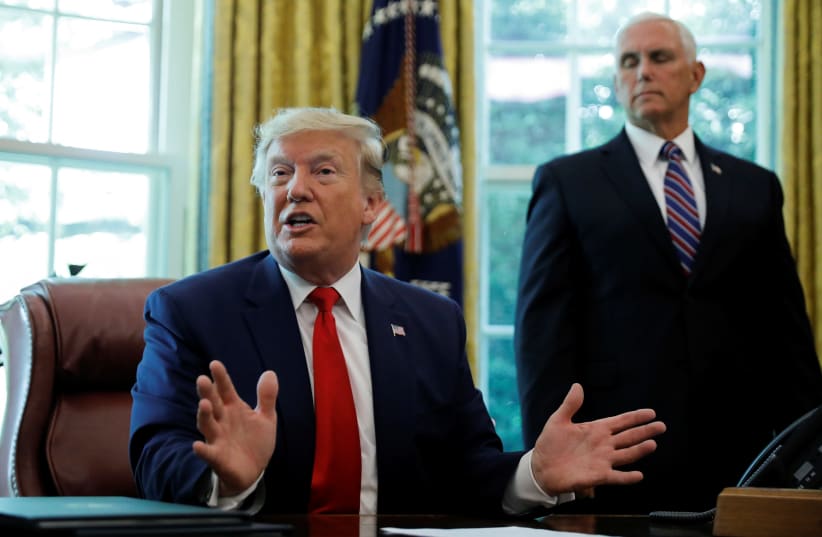WASHINGTON - US President Donald Trump released an executive order on Monday authorizing the imposition of sanctions “against current and former officials of the Government of Turkey and any persons contributing to Turkey’s destabilizing actions in northeast Syria,” according to a White House statement.It added that steel tariffs will be increased back up to 50%, the level prior to reduction in May.“The United States will also immediately stop negotiations, being led by the Department of Commerce, with respect to a $100 billion trade deal with Turkey,” said the president.“The United States will aggressively use economic sanctions to target those who enable, facilitate, and finance these heinous acts in Syria,” Trump continued. “I am fully prepared to swiftly destroy Turkey’s economy if Turkish leaders continue down this dangerous and destructive path.”He said that the executive order will enable the United States to impose powerful additional sanctions “on those who may be involved in serious human rights abuses, obstructing a ceasefire, preventing displaced persons from returning home, forcibly repatriating refugees, or threatening the peace, security, or stability in Syria.”According to the statement, the order will authorize a broad range of consequences, including financial sanctions, the blocking of property, and barring entry into the United States.The US Treasury Department’s Office of Foreign Assets Control (OFAC) also announced on Monday new sanctions against two ministries and three senior Turkish Government officials in response to Turkey’s military operations in Syria.“The Turkish Government’s actions are endangering innocent civilians, and destabilizing the region, including undermining the campaign to defeat ISIS,” OFAC wrote in a statement. “The Government of Turkey’s Ministry of National Defense and the Ministry of Energy and Natural Resources, as well as the Minister of National Defense, Minister of Energy and Natural Resources, and the Minister of the Interior are blocked as a result of today’s action.”The statement said OFAC is “prepared to impose additional sanctions on Government of Turkey officials and entities, as necessary.”Treasury Secretary Steven Mnuchin said the US “is holding the Turkish Government accountable for escalating violence by Turkish forces, endangering innocent civilians, and destabilizing the region.”According to OFAC announcement, persons that engage in certain transactions with persons designated today may themselves be exposed to designation, and “any foreign financial institution that knowingly facilitates any significant financial transactions for or on behalf of the persons designated today could be subject to US correspondent or payable through account sanctions.”Pence to lead a high-level delegation to AnkaraTrump spoke on Monday with Erdogan and Kurdish general Mazloum Kobani, Vice President Mike Pence told reporters at the White House. He said that Trump asked him to lead a delegation to Ankara, in a push to mediate a ceasefire. National Security Adviser Robert O’Brien is expected to join the high-level delegation.Erdogan requested the call with Trump, according to Pence.“President Trump communicated to him very clearly that the United States of America wants Turkey to stop the invasion, to implement an immediate ceasefire and to begin to negotiate with Kurdish forces in Syria to bring an end to the violence,” the vice president said.Pence told reporters that Trump received a commitment from Erdogan not to attack the city of Kobani.“President Trump was very direct on that point,” said Pence.Graham and Pelosi talk bipartisan legislation to impose sanctions on TurkeyEarlier on Monday, Republican Sen. Lindsey Graham said he discussed with Speaker of the House Nancy Pelosi a bipartisan legislation to impose sanctions on Turkey.
“Just spoke with Speaker Pelosi regarding congressional action on Turkey’s incursion of Syria,” Graham tweeted. “[The] Speaker supports bipartisan sanctions against Turkey’s outrages in Syria. She also believes we should show support for Kurdish allies and is concerned about the reemergence of ISIS. I will be working across party lines in a bicameral fashion to draft sanctions and move quickly, appreciating President Trump’s willingness to work with the Congress. The Speaker indicated to me that time was of the essence.”Following her conversation with Graham, Pelosi tweeted that “Our first order of business was to agree that we must have a bipartisan, bicameral joint resolution to overturn the President’s dangerous decision in Syria immediately. Next, we must put together the strongest bipartisan, bicameral sanctions package similar to the bipartisan bill the House is advancing. As we find ourselves in a situation where the President gave a green light to the Turks to bomb and effectively unleashed ISIS, we must have a stronger sanctions package than what the White House is suggesting.”Just spoke with Speaker Pelosi regarding congressional action on Turkey’s incursion of Syria. Speaker supports bipartisan sanctions against Turkey’s outrages in Syria. She also believes we should show support for Kurdish allies and is concerned about the reemergence of ISIS.
— Lindsey Graham (@LindseyGrahamSC) October 14, 2019
Pleased to have a conversation with Senator @LindseyGrahamSC this morning. Our first order of business was to agree that we must have a bipartisan, bicameral joint resolution to overturn the President’s dangerous decision in Syria immediately.
— Nancy Pelosi (@SpeakerPelosi) October 14, 2019
